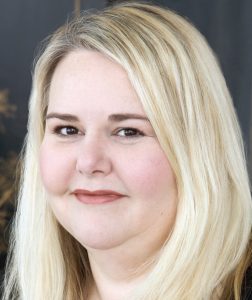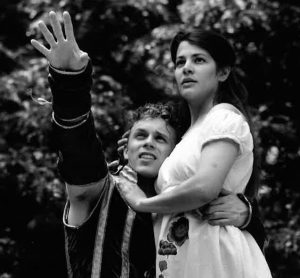
Jessica Andrews
Heart of America Shakespeare Festival started pretty much the way many Kansas City performing arts organizations have begun: Nobody really knew if it was going to get off the ground at all. Thirty years later, it is flying high. Not only is it one of the nation’s most celebrated professional outdoor theaters, it is venerated in Shakespeare circles nationwide as a foundation-stone for the propagation of the Bard’s works in the Midwest.
Best of all, it’s still free. And what better work to mark an anniversary than the tragedy that is most deeply lodged in our consciousness: Romeo and Juliet.
This is a work that “features some of the most poetic, well-known, and beloved language in all of Shakespeare’s canon,” said Sidonie Garrett, Festival executive artistic director. “I look forward to introducing it to a new generation of young people.”
The 30-year mark is important “not because of a specific number,” said Bill Yé, co-president of the Festival’s board of directors.

Evan Cleaver
“Sharing the poetry, humanity, and humor of Shakespeare… and doing so without charging admission, is at the heart of our mission and is part of the arts heartbeat of Kansas City.”
We recently asked Sidonie a few piquant questions about the Festival’s past, present, and future:
Why choose Romeo and Juliet for the 30th anniversary Festival?
We hadn’t done it in 15 years, which is a lifetime in Shakespeare-land. … To think that there are 15-year-olds who were not even born the last time we did this… so this may be the first time they ever see this play.
It’s a play about divisiveness and it’s a play about intimacy. And we have missed intimacy during COVID, and I think we’ve all been feeling the divisiveness we’ve been living in.
If you hate one another and you don’t do anything to fix it, it doesn’t end well. So both of those reasons were key to me wanting to do this story now. … A play that has intimacy and care and love at its core is important.

Sidonie Garrett
What does Shakespeare tell us about why these families are feuding?
Absolutely nothing. … The play starts with “two houses alike in dignity… in fair Verona.” So they’re pretty much alike, and they’ve probably both got money.
Why is it important that we see these plays live?
This is classical dramatic literature. When you sit and read it in your armchair, it does not work for most people, because it’s meant to be acted and performed. So bringing it to you live onstage, in a very clear and truthful and specific way, and sizing it for Southmoreland Park: those are the things I focus on every single time.
People say, Oh I don’t understand Shakespeare, it’s so confusing. It’s not confusing! It is written in the English language, which we all speak. We may not be familiar with all these words, but if you’re telling the story in the right way, and physicalizing the language, as we do, bringing it to life: it’s rich and complex and tells of very human behaviors.

The late Marilyn Strauss / Photo by Brian Paulette
These stories still speak to us, as does the language. … We need stories to sustain us, we need the connection that stories bring to us. We need to hear music, to read, to see plays, to experience the arts.
How big of a deal was the Festival when it was first established in 1993?
It was radical. … Classical theater? Free, in a park? It was unique to the area. Certainly there was nothing like it in the state.
The idea was based on New York’s Shakespeare in the Park festival. Marilyn Strauss had been living in New York, and she decided she wanted to come home. But she wanted to do something. … So she knew Joseph Papp, and he said, ‘Why don’t you go home and start a Shakespeare Festival?’ So it’s wholly built on the New York model.
How difficult is it to create a fully professional production that is free to the public?
The cost of free is high, and you can quote me on that. … There are people who are not able to afford a ticket price, but they can still come, because it is funded by the “vox populi.” It’s supported in many different ways to enable it to be free for those who can’t afford to come any other way.

The 1996 performance, the Festival’s first Romeo and Juliet, starred Carrie Vujcec and Jason Chanos. / Photo by Doug Hamer
What have been some Festival milestones over the years?
Year five, which was our first Romeo and Juliet, was a milestone, because that was the first time we had a real “built” set. The Festival was growing, and we used to have a wooden deck. And we used a lot of floor mics before we had many wireless mics, so the actors would be fighting the sound of men’s boots stomping on the wooden floor.
We have a Steeldeck now and we build on top of it, which has made a huge difference in terms of quality. If your deck is all wood, it does warp with the weather.
—By Paul Horsley
For tickets to Romeo and Juliet, call 816-531-7728 or go to kcshakes.org. To reach Paul Horsley, performing arts editor; send an email to paul@kcindependent.com or find him on Facebook (paul.horsley.501) or Twitter/Instagram (@phorsleycritic).